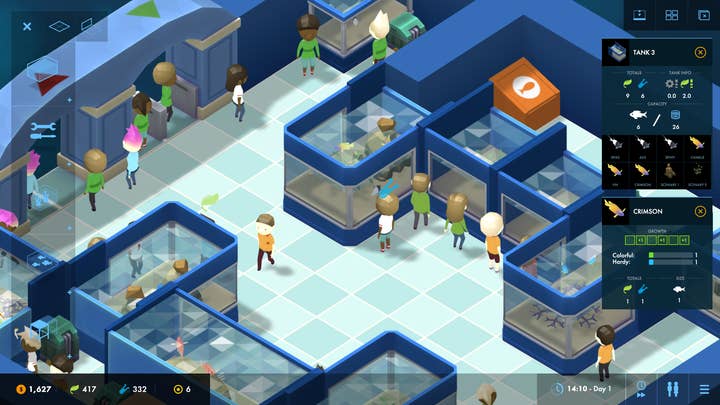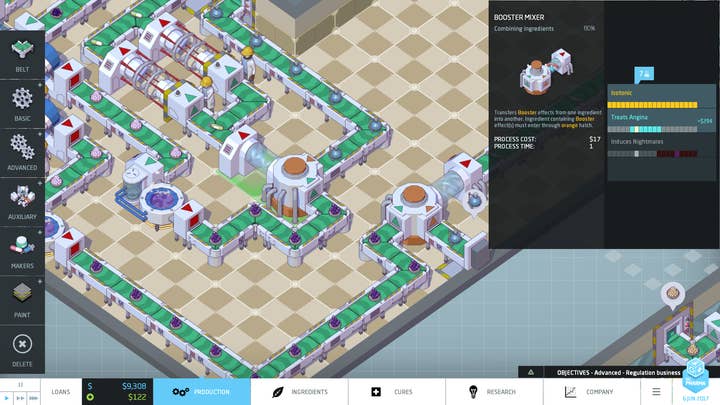"Design a game that lends itself to catchy review titles or YouTubers' dick jokes"
Big Pharma creator Tim Wicksteed discusses making a title that promotes itself ahead of his Develop:Brighton talk
The world of video games is so abundant with content, developers can no longer afford to take the stance of 'build it and they will come' (if they even could before). Marketing has become as important as game design when it comes to ensuring your title's success - and indie developer Tim Wicksteed of one-man studio Twice Circled says the two overlap more than you might think.
Best known as the creator of Big Pharma and currently working on aquarium-themed sim Megaquarium, Wicksteed will be attending Develop:Brighton next week to deliver a talk entitled 'Designing a game that markets itself'. Speaking to GamesIndustry.biz ahead of this presentation, he reflects on indie attitudes towards marketing.

"There are traditionally two perspectives developers take on marketing," Wicksteed tells us. "Some say that 'it's all about the game, a good game will float to the top without marketing'. The other common perspective is that 'it's all about the marketing, the game means nothing unless you market it effectively'. I believe the truth is somewhere between the two. What drives a game's sales is definitely the marketing. But I believe the vast majority of that is built into the design of the game itself."
He continues: "A lot of indies - myself included at one point - see marketing as a job that needs to be done at release time, after they have finished the game. This is a huge mistake. It's not necessarily their fault, they've been to talks where they've been told over and over that it's really important to send personalised emails to press - which by the way, I think is a total waste of time unless you have some kind of existing connection with them.
"What drives a game's sales is definitely the marketing. But I believe the vast majority of that is built into the design of the game itself"
"The great news is that the really important part - namely, designing a game that is innately desirable, one which markets itself - is exactly the part of development that indies are most passionate about."
The key, as he will discuss in his talk, is "implementing specific features into a game that make it attractive to players, YouTubers, streamers and traditional press", although he notes that the same features won't be attractive to everybody.
Wicksteed has experience with this thanks to the hugely popular Big Pharma, although the indie dev says he would be "the first to admit that some of its success was accidental rather than from any divine gift I have for marketing."
"Is there any practical gameplay reason to feed your guests to the sharks? No. Am I going to include the ability to do so anyway? You bet I am"
He explains: "I knew the pharmaceutical theme would be good from a traditional games press perspective, but what really surprised me was the game's popularity among YouTubers and streamers. After the fact, I've come to the conclusion that part of the game's popularity among video creators came down to viewer-friendly features such as the ability to name your drugs, the open-ended gameplay and opportunity for body humour - like the side-effect, 'Can Cause Anal Leakage'. These aren't enough in themselves to sell a game, but they might clinch the decision for a video maker to give your game a shot.
"I've taken these lessons forward to Megaquarium, where I've tried to replicate the open-ended gameplay and add even more opportunities for humorous interactions. Is there any practical gameplay reason to feed your guests to the sharks? No. Am I going to include the ability to do so anyway? You bet I am."

The way to design a game that is as marketable as possible - particularly in an age of YouTube and livestreaming - is to think carefully about who you're targeting with your title. And this doesn't just mean the end user.
Wicksteed says: "It's really important to seriously, almost cynically, target each part of the industry and think 'how can I design this game so that it's attractive to them?'
"Obviously you want to design a game that is fun for players... but it's also important to design a game that lends itself to a journalist's catchy review title or a YouTuber's dick jokes"
"I imagine developers already do this for the players. It stands to reason, obviously you want to design a game that is fun for the players that buy it. But from a marketing perspective, it's also important to design a game that lends itself to a journalist's catchy review title or a YouTuber's ability to make dick jokes. The auto-generated names of Erectile Dysfunction products in Big Pharma were especially popular."
He adds that considering your game's marketable qualities can also help with advertising, even if you have the support of a publisher behind you.
"The same features which make a game attractive to the press can probably be exploited to make an advert that converts well, too," he says. "I'm already experimenting with Facebook adverts for Megaquarium and I'm really pleased with how well the adverts are converting to page 'likes'. For me, this is a positive indicator that the general concept of the game is highly marketable."
Social media has become a crucial pillar of marketing and promotion in recent years, and one developers can take full advantage of with little to no financial investment. When asked which channels are the most effective at connecting studios with potential customers, Wicksteed says it's "less about where you post and more about what you post."
"As long as you have a defined strategy which targets your specific audience then I think anything goes," he adds. "Personally I like making YouTube videos, but others might like to stream or post daily pictures on Instagram/Facebook. If it works, keep doing it."

Another important factor is observing what other studios are doing. That's not to say developers should copy the tactics of their most successful rivals - what works for one title may not work for another. But by and large it's possible to draw inspiration from the leading players in this industry and learn from them. Wicksteed recommends the writings of Ryan Clark, creator of Crypt of the Necrodancer, but even says the AAA space holds valuable lesssons for indies.
"You can take inspiration from just about any successful game or studio you are a fan of... Hearthstone owes a huge amount of its success to its popularity with YouTubers"
"You can take inspiration from just about any successful game or studio you are a fan of," he says. "I take a huge amount of inspiration from Blizzard because basically everything they make is amazing. Hearthstone owes a huge amount of its success to its popularity with YouTubers. Why do YouTubers love it so much? Because it allows them to exhibit their creativity with deck building, skill with deck playing, and sense of humour with the wacky combos and random interactions."
He continues: "I was also inspired by Introversion's success with Prison Architect. While the gameplay differences are pretty vast - Prison Architect is about chaos, Big Pharma is about control - they both feed into that management simulation genre. I believe the reason that genre is enjoying such a renaissance at the moment is that the gameplay mechanics tend to vary a lot from game to game, even in the same genre. While I might only buy one first person shooter or 4X game a year, I can play several different simulation/tycoon games because the differences in theme tend to have very deep impacts on the gameplay."
The most important advice he offers fellow developers is to "stop sweating the minutia of marketing at release time and concentrate on the design of the game itself."
He concludes: "The terrifying and liberating truth is that once your game is finished, whether it is a success or not is mostly already decided. Marketing is just a multiplier."
Wicksteed will be expanding on this topic and offering tips on how to achieve marketable game designs during his talk at Develop:Brighton next week.
GamesIndustry.biz is an official media partner for Develop:Brighton 2017
